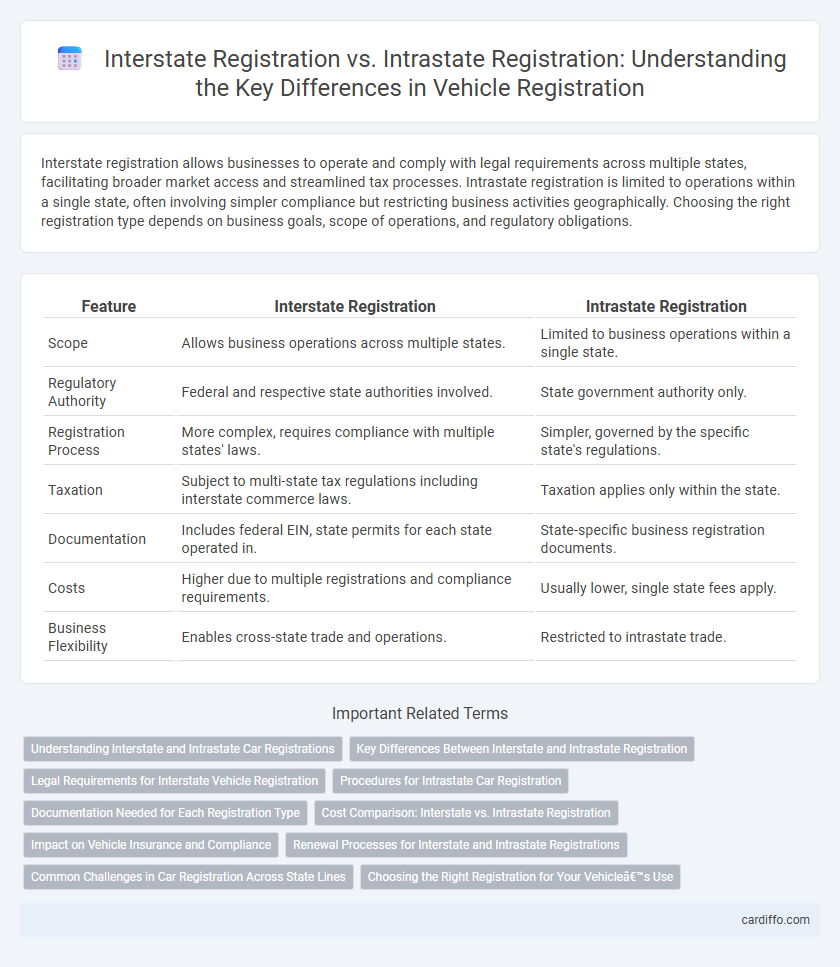Interstate registration allows businesses to operate and comply with legal requirements across multiple states, facilitating broader market access and streamlined tax processes. Intrastate registration is limited to operations within a single state, often involving simpler compliance but restricting business activities geographically. Choosing the right registration type depends on business goals, scope of operations, and regulatory obligations.
Table of Comparison
| Feature | Interstate Registration | Intrastate Registration |
|---|---|---|
| Scope | Allows business operations across multiple states. | Limited to business operations within a single state. |
| Regulatory Authority | Federal and respective state authorities involved. | State government authority only. |
| Registration Process | More complex, requires compliance with multiple states' laws. | Simpler, governed by the specific state's regulations. |
| Taxation | Subject to multi-state tax regulations including interstate commerce laws. | Taxation applies only within the state. |
| Documentation | Includes federal EIN, state permits for each state operated in. | State-specific business registration documents. |
| Costs | Higher due to multiple registrations and compliance requirements. | Usually lower, single state fees apply. |
| Business Flexibility | Enables cross-state trade and operations. | Restricted to intrastate trade. |
Understanding Interstate and Intrastate Car Registrations
Interstate car registration involves registering a vehicle in a state different from where the owner primarily resides, subject to federal and individual state regulations, while intrastate registration occurs within the vehicle owner's home state, adhering to local DMV guidelines. Understanding the specific requirements for proof of residency, insurance, emissions testing, and taxes is essential for compliance in both interstate and intrastate registrations. Failure to properly register a vehicle can result in fines, penalties, or legal complications depending on the jurisdiction where the vehicle is operated.
Key Differences Between Interstate and Intrastate Registration
Interstate registration allows businesses or vehicles to operate across state lines, requiring compliance with multi-state regulations and federal laws such as the International Registration Plan (IRP). Intrastate registration restricts operations to within a single state's borders and adheres solely to that state's licensing and regulatory requirements. Key differences include the scope of operation, regulatory bodies involved, and the complexity of compliance procedures.
Legal Requirements for Interstate Vehicle Registration
Interstate vehicle registration mandates compliance with federal regulations and the Department of Transportation (DOT) standards to legally operate across state lines. Vehicle owners must obtain registration from the state where the vehicle is primarily garaged while adhering to each state's Insurance Minimum Liability Requirements and emissions testing protocols. Non-compliance with interstate registration laws can result in fines, vehicle impoundment, or suspension of driving privileges.
Procedures for Intrastate Car Registration
Intrastate car registration procedures typically require vehicle owners to submit proof of residency, vehicle title, and proof of insurance to the local Department of Motor Vehicles (DMV) or equivalent agency within the state. The process includes completing an application form, paying registration fees, and undergoing a vehicle inspection if mandated by state regulations. Unlike interstate registration, intrastate registration is confined to a single state's jurisdiction, simplifying compliance by adhering to consistent local rules and requirements.
Documentation Needed for Each Registration Type
Interstate registration requires extensive documentation including a valid commercial vehicle registration certificate, proof of insurance covering multiple states, a Unified Carrier Registration (UCR) receipt, and compliance with the International Registration Plan (IRP) and International Fuel Tax Agreement (IFTA). Intrastate registration primarily demands state-specific vehicle registration, proof of local insurance, and compliance with individual state transportation regulations, often with less stringent paperwork than interstate requirements. Documentation accuracy and completeness are critical for both registration types to avoid fines and ensure lawful operation across relevant jurisdictions.
Cost Comparison: Interstate vs. Intrastate Registration
Interstate registration typically incurs higher fees due to the involvement of multiple state agencies and the complexity of complying with diverse regulatory requirements. In contrast, intrastate registration usually offers lower costs as it is limited to a single state's jurisdiction, reducing administrative expenses and paperwork. Businesses must assess these cost differences alongside their operational scope to determine the most economical registration option.
Impact on Vehicle Insurance and Compliance
Interstate registration requires compliance with multiple state regulations, often leading to higher vehicle insurance premiums due to broader coverage needs and increased risk factors. Intrastate registration simplifies compliance by adhering to a single state's rules, typically resulting in lower insurance costs and streamlined policy requirements. Ensuring proper registration type directly impacts insurance validity and legal adherence, reducing potential penalties and claim denials.
Renewal Processes for Interstate and Intrastate Registrations
Interstate registration renewal requires compliance with federal regulations and coordination across state lines, often involving unified online portals that expedite the process for multi-state operations. Intrastate registration renewal is managed solely by the state's motor vehicle department, typically necessitating local documentation and adherence to specific state renewal deadlines. Both renewal types emphasize timely submission to avoid penalties, but interstate renewals demand broader coordination to maintain multi-jurisdictional compliance.
Common Challenges in Car Registration Across State Lines
Interstate registration often faces challenges such as varying state regulations, differing documentation requirements, and complex tax obligations that can delay the process. Intrastate registration simplifies compliance but still encounters issues like inconsistent DMV procedures and regional emission standards. Navigating these hurdles requires thorough understanding of state-specific laws and proactive coordination with multiple motor vehicle departments.
Choosing the Right Registration for Your Vehicle’s Use
Interstate registration allows vehicles to operate legally across multiple states, making it essential for businesses or individuals frequently traveling beyond state lines. Intrastate registration restricts vehicle operation to a single state, offering simpler compliance and potentially lower fees for local use. Choosing the right registration depends on your vehicle's primary use, travel frequency, and specific state regulations to ensure legal operation and cost efficiency.
Interstate Registration vs Intrastate Registration Infographic

 cardiffo.com
cardiffo.com